Introduction
In a world filled with comparison culture and highlight reels, self-acceptance can feel revolutionary. Rather than striving for perfection or seeking validation externally, the growing trend in 2025 is embracing radical self-compassion—loving yourself deeply, flaws and all.
This article serves as your practical guide to nurturing self-acceptance, setting mindful boundaries, and building a gentler inner dialogue. Let’s explore the tools to help you become your own strongest ally.
1. What Is Radical Self‑Acceptance?
Radical self-acceptance is more than just “being okay” with who you are—it’s actively choosing to welcome every part of yourself with kindness and curiosity.
It moves beyond surface positivity—it’s about:
- Accepting emotional complexity
- Letting go of external validation
- Treating mistakes as learning opportunities
- Holding space—even on hard days
2. Social Media & the Comparison Trap
In 2025, more people are opting for “social media sabbaticals” and mindful online breaks because of how harmful curated content can be to self-worth.
Constant comparison can sap your confidence and fuel self-judgment.
Strategies:
- Curate your digital feed—follow accounts that model authenticity and depth
- Spend intentional time offline each day
- Journal about how you feel after scrolling
Mindful media habits can free you from unrealistic standards.
3. Three Practices to Cultivate Self‑Compassion
Let’s break down actionable habits to help you build emotional resilience and kindness toward yourself:
A. The Mirror Affirmation Ritual
Stand in front of a mirror, make eye contact with yourself, and say aloud (or silently):
“I am deserving of love.”
“I accept myself exactly as I am today.”
Do this daily, especially when you’re feeling doubtful or critical.
B. Compassion Breaks During Stressful Moments
When self-judgment arises, pause and:
- Place a hand over your heart
- Take three slow, grounding breaths
- Mentally say: “May I be kind to myself in this moment”
This resets emotional tension and invites calm.
C. Writing a Compassionate Letter to Yourself
Choose a challenge you’re facing. Then write a letter to yourself from the perspective of a caring friend:
- Describe what you admire in you
- Remind yourself you’re trying your best
- Highlight growth—not just mistakes
Come back to this letter when you need extra support.
4. Reframing Resistance: When You’re Not Feeling Kind to Yourself
Sometimes radical self-love feels impossible. Here’s how to shift the inner voice:
- Notice the negative thought (“I’m not enough”)
- Pause and question it—Is it true?
- Replace it with something neutral or kind (“I’m learning. I’m growing.”)
- Validate yourself, even when you stumble
Consistency matters more than perfection.
5. Boundaries as an Act of Self‑Respect
Self-acceptance isn’t just internal. It influences how you show up in relationships:
- Saying “no” when energy is low
- Speaking kindly, even during conflict
- Protecting your peace—socially, emotionally, mentally
Healthy boundaries are boundaries rooted in self-respect.
6. When Self‑Acceptance Becomes Community Care
Self-love extends outward. When you model kindness, others feel invited to do the same.
- Speak openly about mental health
- Normalize imperfect days
- Share your self-acceptance practices with friends
- Encourage others to prioritize inner peace over perfection
Your authenticity can be a beacon of healing for others.
Conclusion
Radical self-acceptance isn’t just feel-good—it’s transformative. As more people in 2025 choose self-compassion over comparison, the world becomes gentler, more connected, and more present.
Start small. Begin with one kind thought—and watch it ripple through your day and those around you.







